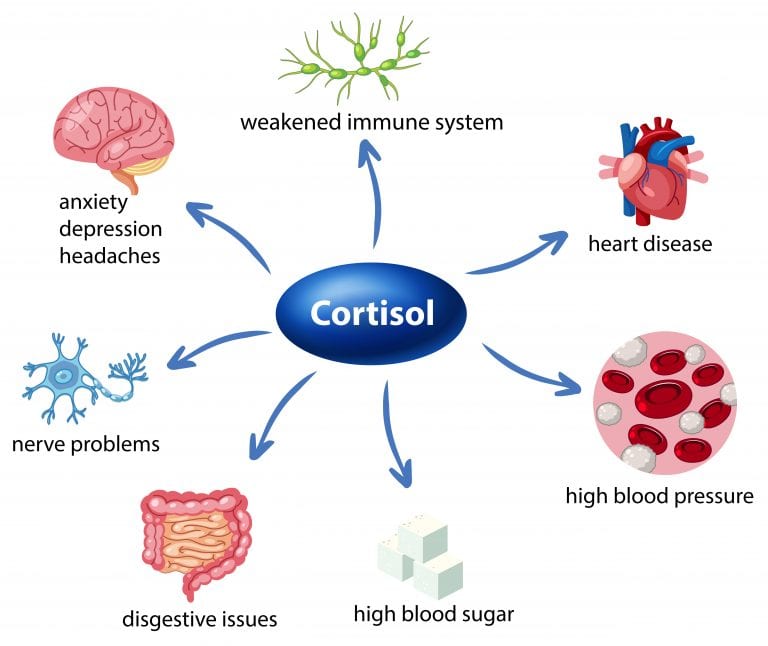Getting stressed out is like second nature to most people in this fast-paced, high-stress world. Some people deal with it by working out since it’s common knowledge that regular and consistent exercise comes with a laundry list of physical and mental health benefits.
However, you might have realized that you couldn’t do as many reps in the gym after a severely stressful week. Don’t worry—you’re not getting weaker. Your system might have just been overwhelmed by stress and is starting to affect your workouts.
What Is Cortisol?
Produced by your adrenal glands, cortisol works with the hypothalamus and pituitary gland to control your mood, motivation, and fear. You might have heard cortisol being described as your body’s built-in alarm system, and you’d be right about that… sort of.
When your brain perceives a threat, your body produces more cortisol and triggers a “fight or flight” response. Your body tries to cope with acute stress by shutting down certain functions of your body or giving you more resources to run, which causes intense symptoms like increased heart rate, heightened blood pressure, muscle tension, nausea, and diarrhea.
However, cortisol serves a very different function in your body when you’re not preparing for your big, nerve-wracking presentation or arguing with a loved one. In moderate and manageable levels, cortisol plays a part in several essential body functions, including:
- Manage your metabolism and blood sugar
- Keep inflammation in the body down
- Control your circadian rhythm (your sleep/wake cycle)
- Temporary energy boost
- Facilitate immune response
- Help memory formation

How Does Cortisol Work?
Your cortisol levels are regulated by your hypothalamus and pituitary gland, both of which are located in your brain. They sense if the cortisol levels in your blood are correct and then send signals to your adrenal glands to finetune and secrete the right amount.
Your cortisol levels in your blood typically follow your diurnal rhythm, which is the highest in the morning when you wake up and fall throughout the day. That said, the natural cortisol secretion schedule follows your daily activity patterns. For example, if you work the night shift, your cortisol levels will be higher during the night.
Not only that, but almost every cell in your body contains cortisol receptors to receive the cortisol they need for your daily functioning adequately. Some people are also wired to produce different amounts of cortisol every time they are faced with a perceived stressor.
Typically, your cortisol level balances itself out once the threat has passed. However, in terms of chronic stress, these unusually high cortisol levels can alter and shut down functions that get in the way, including your digestive or reproductive systems, immune system, and even your metabolism.
How Does Chronic Stress Affect Your Workouts?
Regularly drinking coffee and alcohol, facing tight deadlines, and challenging interpersonal issues can all contribute to heightened production of cortisol in your body. This puts your body in constant survival mode, which affects your daily functioning and what you can achieve in the gym.
Weight Gain
Your cortisol plays a vital role in fat and carbohydrate metabolism, making your weight loss goals one of the first things to go. When you’re constantly stressed out, the body stimulates your appetite to create more energy in your body to combat threats. This results in higher insulin production, which triggers more junk food and sugar cravings.
Instead of reaching for well-balanced meals, you’d more likely go for fast food or ice cream to satisfy your cravings. All that extra calories gets stored in your body as fat if you can’t burn it off in the gym.
Slows Down Healing And Increases Risk Of Injury
It’s normal to feel extra sore after an intense workout. But if you’re still aching and tired despite not working out much, you should look into your stress level, a.k.a. cortisol levels.
Your body has to pick and choose what to maintain when it’s overwhelmed by stress. Unfortunately, cortisol influences your focus, concentration, and memory. You might not realize this, but chances are you’re not focusing properly on your techniques, which leads to a higher risk of injuries and makes your existing pains worse.
Not only that, but you’re also risking higher bone-related injuries when you’re under high stress. The connection between chronic stress and lowered bone mineral density has been well established. Elevated levels of norepinephrine, a neurotransmitter that’s part of your body’s stress response, can severely affect bone development.

Affects Physical Performance
Have you ever noticed that you can’t lift as heavy in the gym or run as much after a particularly stressful week? According to a study published in the Journal of Strength And Conditioning Research, students categorized as high stress in a psychological test have slower recovery of their muscle functions. Even though nothing has changed with their diet and activeness, they still felt hindered and slow.
Even though your lungs and heart are used to your exercise routine, too much cortisol in your bloodstream can quickly overwhelm your body and cause it to shut down. Best case scenario, you’ll be able to get the rest you deserve and come back to fight another day. Worst case? You could risk injuring yourself and putting more health problems on the table.
Slower Muscle Growth
Cortisol is catabolic, which inhibits protein synthesis—bad news for the muscles you’ve already gained. Not only that, but it can accelerate the breakdown of protein into amino acids and sugar in response to stress. With your muscles being used as an energy source, you won’t build much muscle even if you keep with your diet and workout routine.
Not only that, but high levels of cortisol also reduces your testosterone levels. For men, this is a fast-track towards a stress-induced bear belly as lower t-count can reduce your muscle mass and increase fat storage around the waist.
3 Ways To Manage Stress And Reduce Cortisol Levels
Living in chronic stress isn’t always immediately noticeable. But once you recognize the effects it has on your body, you can start taking steps to lower your cortisol levels. It might not be as hard as you think!

Exercise
Exercising reduces the levels of your body’s stress hormones, like adrenaline and cortisol. It also stimulates the production of endorphins, chemicals in your brain that act as your body’s natural painkillers and mood elevators. Fun fact: endorphins are responsible for the “runner’s high”—feelings of relaxation and optimism that runners often feel after a good workout.
However, chronic stress can also severely impact your physical performance and mental strength. The most important thing to consider when exercising to relax is to take it slow when your body asks for it. It might be much better to take a step back for a few days and get yourself in the right headspace.
Get Adequate Sleep
Getting your circadian rhythm sorted out is your number 1 priority when your cortisol levels are unusually high. That’s because sleep problems can exacerbate your stress, making it much harder to go to sleep. As a result, you’ll struggle with even the simplest tasks in the morning when you’re expected to do the best.
Before hitting the sack every night, make sure to do a few relaxation and breathing exercises. You should also try to go to sleep around the same time and have at least 6-7 hours of sleep every day—even if you really need to get your presentation done by 3am.
If you want more information on the, “Importance of Sleep in Muscle Growth” find it all in our article.

Reduce Your Caffeine Intake
Many people rely on coffee to wake up in the morning and five more throughout the day to keep them energized. While that’s helpful in the short term, excessive caffeine consumption can actually elevate your cortisol levels. Pair that with a high-stress lifestyle, and your body is basically wired 24/7.
The key to managing your caffeine intake lies in timing. To combat the dreaded afternoon slump, you can opt for substitutes like matcha to keep your caffeine levels steady throughout the day. Drinking a cup of coffee before working out is also great since you can burn off the energy and boost your physical performance at the same time.
Finally, if you want to find out, “How To Achieve Big Gains At The Gym Naturally,” follow the link to learn more.


